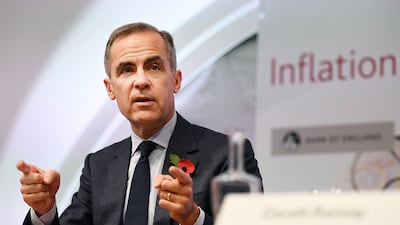Central banks remained in the spotlight last week with the Bank of England (BoE) raising UK interest rates for the first time in 10 years, and President Trump unveiling Jerome Powell as the next chair of the Federal Reserve.
The latest Federal Open Market Committee (FOMC) meeting also refreshed expectations of a December rate hike in the US with the latest economic data there also contributing to the likelihood of another step in the path of monetary policy normalisation.
The BoE’s move to raise UK rates was no major surprise, as a hike had been flagged by its governor Mark Carney back in September, with subsequent economic data only validating such expectations. The Bank’s 25 basis point (bps) hike to 0.5 per cent was effectively a reversal of the ‘emergency’ post-Brexit referendum rate cut from last summer, and so represents less of a ‘tightening’ and more of a decision by the Bank to take its foot just slightly off the accelerator.
The rise in UK inflation to 3 per cent, on the back of the post-Brexit referendum slide in sterling, was clearly the catalyst that prompted the BoE to move, but other economic data has also not been as bad as many (including the bank) had feared, allowing it to act without prompting too much alarm among consumers and businesses.
Going forward the BoE was at pains to emphasise the gradual nature of any further tightening saying that after last week’s hike, "inflation is expected to fall back over the next year, and conditioned on the gently rising path of Bank Rate implied by current market yields, to approach the 2 per cent target by the end of the forecast period".
A gradual rise in the Bank Rate to 1 per cent by the end of 2020 is what is implied by market yields, and the BoE apparently sees nothing to argue with this trajectory. So just another 50bps of hikes over the next three years, but probably nothing much more for the time being.
_______
Read more from Tim Fox:
Equities have outperformed other assets classes in 2017
Uncertainty over the Fed chair's future leaves markets on edge
_______
This also fits in well with the moderate tightening that is underway across the Atlantic in the US and with the cautious approach being taken by the European Central Bank across the English Channel. Major central banks are proceeding with policy normalisation with the utmost care, preparing markets for any adjustments, however small, a long time in advance so as not to destabilise the recoveries that are underway.
The ECB’s cautious messaging the previous week was a case in point, while last week’s FOMC meeting in the US also delivered a carefully calibrated message. The US Fed left interest rates unchanged within a 1 per cent to 1.25 per cent rate band as widely expected, but the economic outlook was upgraded slightly highlighting that ‘economic activity has been rising at a solid rate despite hurricane-related disruptions’. Near term risks to the outlook were said to be balanced, but the statement was consistent with a December tightening conditional on the economic data remaining favourable.
Economic data released since the Fed meeting served to underline the economy’s ‘solid’ credentials, with October employment growth bouncing back strongly from September’s weaker levels, factory orders increasing and service sector activity hitting a 12-year high.
Choosing a Fed chair, who would not rock the boat, may understandably have been one of the main criteria that president Trump had in mind when he selected Fed governor Jerome Powell to be his nomination for the post.
Mr Powell was very much seen as the continuity candidate, and is expected to maintain Ms Yellen's gradualist approach to monetary policy tightening in 2018 at least, having never dissented from major Fed decisions during his tenure. He is also seen as a moderate when it comes to regulation and will probably have a relatively easy confirmation process being a sitting governor.
However, Mr Powell’s promotion means that there will still be four vacancies on the Fed’s board, including the vice chair position. Thus his management of a relatively newly constituted board will quickly come under scrutiny. This may make it less easy for him to simply execute the policies of his predecessor, and could create challenges that are unexpected. Jerome Powell may have come from relative obscurity to lead the Federal Reserve, but it may well be the other appointees at the Fed that remain to be made that will determine whether he succeeds.
Tim Fox is chief economist and head of research at Emirates NBD


